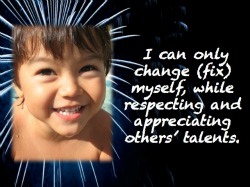 Anyone can change the world but few do so. At Synapse School, our Six Seconds lab school, it is our mission to create those who do, the change makers of our world. This guiding principle strikes at the heart of everything we do there and with the work of Six Seconds. I would like to share with you six basic tenets I think all change makers, young or old, need to have in order to make a real difference in this world. They aren’t ground-breaking or difficult, yet they are rare.
Anyone can change the world but few do so. At Synapse School, our Six Seconds lab school, it is our mission to create those who do, the change makers of our world. This guiding principle strikes at the heart of everything we do there and with the work of Six Seconds. I would like to share with you six basic tenets I think all change makers, young or old, need to have in order to make a real difference in this world. They aren’t ground-breaking or difficult, yet they are rare.
Key Concept #1: Only change yourself.
While it is tantalizing to want to fix boyfriends, husbands, children, brothers, and sisters—let me assure you from research, from personal knowledge, and experience, you cannot.
When we try to “fix” someone else, we imply we come from a more enlightened point of view. We send a message that we are wiser, smarter. Unfortunately, this message sends an even more powerful and negative message that the other person is not “good enough.”
Such rejection (even in small amounts) builds resentment, smothers affection, and creates distance. Psychologists, Paul Coleman and Eli Finkel recommend the practice of acceptance. Acceptance preserves the other person’s autonomy.
Key Concept #2: Don’t assume; ask.
 I think assumptions are the mother of all screw-ups. For example, to cheer me up or bring a bit of joy into my life, give me chocolate—chocolate cake, root beer floats with chocolate ice cream, Godiva chocolate, French chocolate. That is what I want.
I think assumptions are the mother of all screw-ups. For example, to cheer me up or bring a bit of joy into my life, give me chocolate—chocolate cake, root beer floats with chocolate ice cream, Godiva chocolate, French chocolate. That is what I want.
I suspect, however, that is not what you would want. You might prefer dinner out, flowers, a hug, a back rub, or a new book.
In order to know what someone needs, it is better to ask. Asking correlates with the growth and development of empathy. Numerous research studies demonstrate that empathy makes you a better salesman, a better friend, a better teacher, and a better parent. Last year, Synapse through the tutelage of IDEO, discovered empathy makes you a better inventor.
We have all heard of the Golden Rule— do unto others as you would have them do unto you. I would like to suggest the palladium rule. Palladium is the most expensive metal in the world. Presently, it is $1,850 per ounce. This rule says, “Give to another not what you think s/he wants, but want s/he needs— and understand by asking.”
Key Concept #3: Take risks.
 Courage helps resolve the yearnings in our heart. Courage makes it possible for those tiny seeds of dreams to bloom and flourish. Courage supports persistence. Courage helps us to get back up after falling down.
Courage helps resolve the yearnings in our heart. Courage makes it possible for those tiny seeds of dreams to bloom and flourish. Courage supports persistence. Courage helps us to get back up after falling down.
For example, Winston Churchill was a bulwark of England during WWII and a survivor of several personal adversities, including a lisp and repeating sixth grade. During the war he was asked to give a speech to a boys’ school, Harrow, on October 29, 1941. He arrived with top hat, cane, and a cigar.
He said, “This is the lesson: never give in, never give in, never, never, never, never—in nothing great or small, large or petty—never give in—except to convictions of honor and good sense. Never yield to force, never yield to the overwhelming might of the enemy.” Then he sat down.
Key Concept #4: Wait before deciding.
 What do these people have in common? An Olympic tennis player returning a serve? A comedian about to reveal a punch line? A teacher anticipating an original answer? The common thread is the ability to successfully wait.
What do these people have in common? An Olympic tennis player returning a serve? A comedian about to reveal a punch line? A teacher anticipating an original answer? The common thread is the ability to successfully wait.
I wish American society were not so obsessed with speed, productivity, and efficiency. Decisions made in a minute are considered a virtue and procrastination a crime.
Frank Partnoy, author of the book Wait, maintains it is not the faster we move that is better, but the reverse. He argues that effective decision-making benefits profoundly from delay; the time should be spent analyzing, synthesizing, and evaluating.
Teachers have known for years that a 10 second wait time—10, 9, 8, 7, 6, 5, 4, 3, 2, 1—when a question is asked improves both the quality and quantity of responses/ideas from students.
A wise decision requires reflection and a reflection requires a pause. Frank Partnoy says, “If you have a minute, wait until the last second. If you have a year, wait until the last day.” I suggest that if you have a second, wait until the last quarter.
Key Concept #5: Know that hard work and character triumph over high-test scores.
 David Shenk’s book, The Genius in All of Us: New Insights into Genetics, Talent, and IQ, gives hope to those of us who have not yet written a published poem or played quarterback for the Forty-Niners.
David Shenk’s book, The Genius in All of Us: New Insights into Genetics, Talent, and IQ, gives hope to those of us who have not yet written a published poem or played quarterback for the Forty-Niners.
His carefully gathered research demonstrates that genes are not a blueprint that predicts greatness for some and doom for the rest of us. Stimulus is what counts. Stimuli make the difference in long-term achievement and/or innovation. Genes are not terminal and environment and a growth-mind set are critical to long-term accomplishment.
I wish all of you could have seen, as I did recently, 18 kindergartners being scientists. I observed 18 pairs of eyes behind plastic protective glasses, 18 pairs of tiny fingers carefully shredding owl pellets and searching for buried treasure. In this case, the treasure was those tiny, hidden bones. When found, the children then identified and catalogued the fragments according to their guide sheet.
They were displaying the intensity and intrinsic motivation of 45 year-old scientists. Clearly, they were learning that hard work is crucial. Reality dictates that with 10,000 hours of hard work, almost anything can be accomplished.
 Key Concept #6: Remember friends are more important for long life and happiness than any other element.
Key Concept #6: Remember friends are more important for long life and happiness than any other element.
For years we have been hearing about the importance of veggies, exercise, and a moderate life style for a long, healthy life. However, new research is highlighting the importance of supportive friendships. The higher both the quantity and quality of your relationships, the longer you will live.
Julianne Holt Lunstad has discovered that a low level of social interaction has as much negative effect as smoking 15 cigarettes a day. Who knew? Sheldon Cohen, in a research study with nasal drops containing a cold virus found that those individuals who reported the greatest diversity of friends were four times less likely to develop a cold. Our friends help us beat the stress of modern day life.
In conclusion
People like eureka stories, but mostly they are myths. For example, I doubt if there really was an apple in Newton’s discovery of gravity. I doubt if Berners-Lee thinks he created the world–wide web overnight.
I think it is fascinating that the Post-It Note took 12 years from creation of the first one to the creation of revenue from them. What would I do without a pack at home, the office, and in my purse? All of these ideas took time.
In schools and in homes we have children with ideas germinating, as they play with a toy, interact with a friend, or take something apart. I believe that if a discovery comes, it will not be dependent upon genius, but will instead be built upon the nurturing teachers and families who will encourage creative, even wild ideas in collaboration and cooperation with others. Make sure your child has “tinkering time” both alone and with friends. And the child in you – s/he needs tinkering time because you, too, can change the world. Enjoy!
What do you think? Can we change the world with these concepts? Or are they alive and kicking in your families, schools and communities? Share your thoughts with us in the comments!
And would you do me a favor? Please share on Facebook, Pinterest, Twitter and Google + if you liked this article. Others may love this type of information. There are buttons below.

[…] Six Seconds, we want to create change makers. And, in order to develop people who will challenge the status quo, implement plans for positive […]
[…] the first post, 6 Surprisingly Simple Ways to Change The World, I outlined the six key concepts to becoming a change maker. In the second post, 6 Children’s […]
[…] And we can begin to transform our personal world. […]
[…] to say that ) started Six Seconds, a global organization supporting people-performance and positive change that now operates in 10 major regions, and supports practitioners in over 75 […]
[…] Second, is the furthering of Synapse’s mission for building and growing change makers. […]
[…] The solution to a crisis or a problem may not be easy to discover. However, a winner will relentlessly pursue new avenues and consistently experiment. In the final analysis, success may only be a matter of persistence. […]
[…] books are correlated with the 6 Surprisingly Simple Ways to Change The World that I believe are critical for success at home, at work, and at play. […]